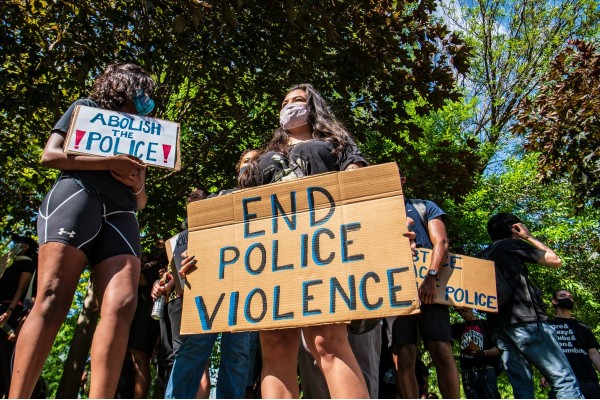-

Where’s the transparency with an inactive police body camera?
Bystander recordings of use of force, including videos as brazen as the one recorded by Mr. Korchinski Beals, bring immediate attention to police behaviour, offering transparency and accountability in situations where the public cannot expect the police will necessarily share camera footage, let alone activate their body-worn cameras.
-

Transparency is voided when police weaponize copyrighted music
An unsettling trend in law enforcement is occurring whereby police officers are weaponizing copyrighted music to thwart bystander recordings of police from going viral. During a recent exchange with Black Lives Matter activists, a sheriff’s deputy in California was caught pulling out his phone to soundtrack the interaction with Taylor Swift’s “Blank Space.”
-

Body-worn cameras and ending the public subsidization of police accountability
Although body-worn cameras have become widespread in law enforcement agencies across the United States, taxpayers have continued to bear the brunt of the financial costs associated with police accountability. Officers should absolutely be held accountable for bad behaviour caught on body cameras but the public should not be expected to continue to subsidize it.
-

Ontario’s priority should be public health—not profits and police
If social media is any barometer, there is hunger for change across Ontario. All factions of the left need to propose an alternative agenda at the scale of the crisis that prioritizes public health over profit and police. Only then can we break with the lethal logic underpinning the Ford government: that death and disaster are an acceptable cost in the pursuit of profit.
-

Protecting police with hate speech legislation will not bring respect to law enforcement
Proper respect is earned, not given or forced. Increased police force whether through the use of violence in response to protest speech, as a result of perceived disrespectful encounters with citizens, or labeling public criticism of police actions that result in death as “hate speech” will never bring any moral authority or more respect to police. Indeed, it will surely do just the opposite.
-

Social media has done more for transparency and accountability than police body-worn cameras
Following the circulation of a recent video of a violent altercation with police, Montréal mayor Valérie Plante has renewed calls for police body-worn cameras. The cameras are also currently being discussed in Winnipeg. Viral videos on social media have arguably done more for police transparency and accountably than body-worn cameras.
-

‘Defund the police’ means re-fund the community
On February 16, a group of abolition organizations across the country released a historic declaration to divest from prisons and policing and build safer communities for all. It gained immense traction nationally, with prominent signatories from the public sector and mainstream unions. But what is the deeper meaning of this movement, and what has happened since the historic protests of the summer?
-

Unmasked police are a public health hazard
Unmasked police officers are a public health hazard. If the Winnipeg Police Service is concerned about maintaining its legitimacy, it will mandate all officers to wear a mask while on duty at all times. And, if the provincial government truly cares about public health, it will ensure everyone, without exception, is respecting public health orders.
-

‘Never forget it’: Black History Month and police brutality
There are myriad ways in which people can honour Black History Month. Listening to the stories and narratives of Black Canadians is one good way. Hip-hop storytellers serve as a vital voice, one uniquely positioned in history with a subjective awareness of racism, while also speaking of the lived experiences of Black and brown people in Canada in the present.
-

How inquests into police violence entrench the oppressive institutions of settler colonial society
The results of inquests and inquiries into police violence often end up excusing and entrenching oppressive institutions. Worse still, policymakers simply ignore their recommendations completely. Canadian Dimension spoke with Sherene H. Razack, Distinguished Professor in Women’s Studies at the University of California at Los Angeles, about the function of inquests and inquiries in a settler colonial society.



